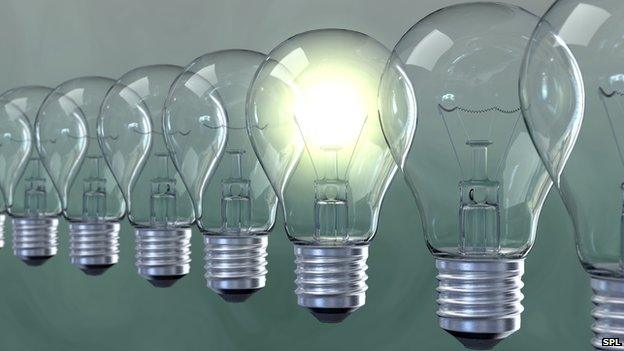Scottish independence: SSE says single energy market 'likely' post Yes
- Published

The future of energy in Scotland is a key battleground in the independence debate
A single UK energy market is "likely" if Scotland votes to be independent, according to SSE.
In a statement to investors the Perth-based energy giant also said post-independence negotiations could lead to changes in the existing single market.
The Scottish government has insisted current energy market arrangements would continue following a "Yes" vote.
But UK Energy Secretary Ed Davey has said such a plan "goes against all commercial logic".
In a business update, SSE, the UK's second largest energy supplier, said it had been undertaking work to manage the "uncertainty" and "increased legislative and regulatory risk" associated with the referendum, which takes place on 18 September.
It concluded that "a single energy market in Great Britain would be the most likely outcome in the event of a Yes vote".
The statement also recognised that post-independence negotiations between the Scottish and UK governments could be "complex" and might result in changes to the existing market.
It added: "SSE has already put in place arrangements to ensure that it takes account of this uncertainty in its decision-making and is undertaking work to ensure that it has a clear view of the issues that would arise should there be a 'Yes' vote, and is in a good position to engage constructively with the Scottish and UK governments in the event of Scotland ceasing to be part of the UK."
'Key battleground'
Energy has emerged as a key battleground in the referendum debate.
The Scottish government's White Paper on independence, external states "a single GB-wide market for electricity and gas will continue with the current market trading arrangements".
However, speaking at a Scottish renewables conference last week, Mr Davey insisted the Scottish government's plan "goes against all commercial logic" and independence would not mean "a continuation of business as usual".
Last month, Labour's Shadow Energy Secretary Caroline Flint said energy bills would go up in an independent Scotland, a claim Scottish Energy Minister Fergus Ewing described as a "political threat".
Mr Ewing welcomed SSE's intervention, saying a single UK energy market was "in everyone's interests".
He added: "Affordable home energy and the ability of vulnerable consumers to heat and power their homes is of utmost concern for this government.
"We welcome that SSE supports our intention to remove costs of vital energy efficiency measures from customers' bills and to meet these from central government resources.
"Scotland's huge offshore renewables resource will have a major role to play in meeting future UK energy needs - but UK government's half-hearted and delayed reforms to the energy market are a serious threat to the vital investment required."
A spokesman for the UK government's Department for Energy and Climate Change said there was "no guarantee" that the current UK-wide market would continue should Scotland vote "Yes" in September.
He added: "As two separate countries, respective governments and regulators will understandably be focused primarily on securing outcomes that best serve their own policy objectives and these would not always be the same.
"There are numerous issues which would need to be considered, including the role of an independent Scottish regulator, whether an independent Scottish state would have its own system operator, how energy supply and demand would be balanced in Scotland and whether the two states would be prepared to share any of the costs associated with managing energy networks and investment."